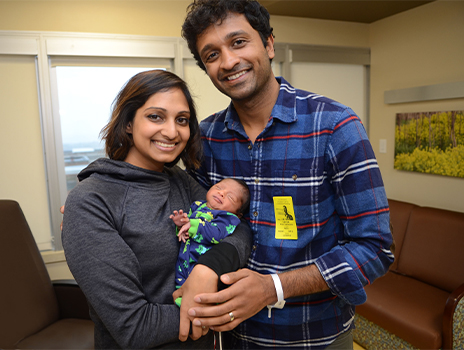Surrogacy after Cancer: One Couple's Story


Pediatricians Manjusha and Philip Abraham met during medical school and married in 2012. He was a 3rd-year resident at the University of Kansas School of Medicine. She was in her first year.
By 2015, the Abrahams began to talk more seriously about starting a family. But first, Manjusha wanted genetic testing for the BRCA gene mutation.
"There is a history of breast and ovarian cancer in my family," explains Manjusha.
Genetic counselors at The University of Kansas Cancer Center conducted the test in March 2015. The results confirmed Manjusha's fears – she carried the mutation. Even worse, a follow-up MRI revealed she had early-stage breast cancer.
Oncologist Priyanka Sharma, MD, guided the couple through diagnosis and treatment. Due to Manjusha's genetic risk factors, Dr. Sharma recommended an aggressive approach.
At 29, Manjusha had a double mastectomy. One month after breast surgery, she began chemotherapy treatment. After chemotherapy, she had both ovaries removed.
Each procedure reduced Manjusha's cancer risk, but also limited her and her husband's choices for starting a family. That's because many cancer treatments, such as chemotherapy, can harm a woman's reproductive system. And without ovaries, a woman is unable to produce eggs.
At every stage in their treatment process, the Abrahams consulted with multidisciplinary experts at The University of Kansas Health System about their fertility preservation options. Knowing that the couple wanted to have a family, advanced reproductive specialists retrieved several of Manjusha's eggs for fertilization and freezing before starting her chemotherapy.
"We only had a limited amount of eggs available. We were fortunate this was an option," says Philip.
By June 2016, Manjusha's chemotherapy was complete and she was cancer free

There are many reasons it may be impossible or unsafe for you to carry a pregnancy, including:
In these situations, surrogacy may be a good option. Call 913-588-1227 to schedule an appointment with a reproductive medicine specialist.
Philip and Manjusha discussed many family planning options, including surrogacy and adoption. But in the fall of 2015, the Abrahams traveled to a wine festival in Hermann, Missouri, with another married couple – Jerod and Carissa Stanton. The 4 toasted to the end of Manjusha's chemotherapy.
That's when Carissa stepped forward and offered to carry the Abraham's embryo.
"We were floored," recalls Manjusha.
"We couldn't say no," adds Philip.
Carissa Stanton, MD, knows a bit about pregnancy. She's the former medical director of the full-term nursery at The University of Kansas Health System and had mentored Manjusha during her pediatrics residency.
Carissa and Jerod have 3 children of their own.
"Our family was complete, so we wanted to help Phil and Manju make the family they deserve," she says
Young women going through chemo and cancer treatments, who want to start a family, need hope. They need to know there's a light at the end of the tunnel. It's a long tunnel, but once you get there, there are options. – Manjusha Abraham
Manjusha and Philip were living and working in St. Louis, Missouri, while Carissa was carrying their unborn baby in Kansas City, Missouri. But despite a 240-mile separation, the Abrahams and Carissa stayed in touch using Facetime. They also traveled back to Kansas City for important appointments.
"Knowing [our baby] was being carried by Carissa gave us peace of mind," Philip says.
When Carissa was 35 weeks along, Philip and Manjusha came to Kansas City for a baby shower in their honor. Early the next morning, they received the call: Carissa was at the hospital. Their baby, Nathan, was born later that day, February 17, 2018.
Nathan stayed briefly in the Neonatal Intensive Care Unit. Then, the Abraham family was on their way back home to St. Louis.
Philip laughs, "We came back from our baby shower with a baby."
Now, with the birth of their son, the Abrahams want to send a positive message about surrogacy to others who may be unable to carry a pregnancy.
"Young women going through chemo and cancer treatments, who want to start a family, need hope," Manjusha says. "They need to know there's a light at the end of the tunnel. It's a long tunnel, but once you get there, there are options."
"We had so many hurdles," says Philip. "But Nathan amazes us. We were very fortunate."
We offer a variety of appointment types. Learn more or call 913-588-1227 to schedule now.
Offering to carry another person's pregnancy is a generous, yet complicated, decision. Donating an egg is even more personal. Some women volunteer to carry for a family member or friend. Some women request payment for their services. It's important to know there are many legal issues with third-party reproduction and each state has its own laws about surrogacy.
Typical requirements:
Our advanced reproductive team is well-versed in the medical, legal and financial issues of surrogacy. We assist people who have found their own surrogates – like the Abrahams – as well as those who need to connect with a carrier.